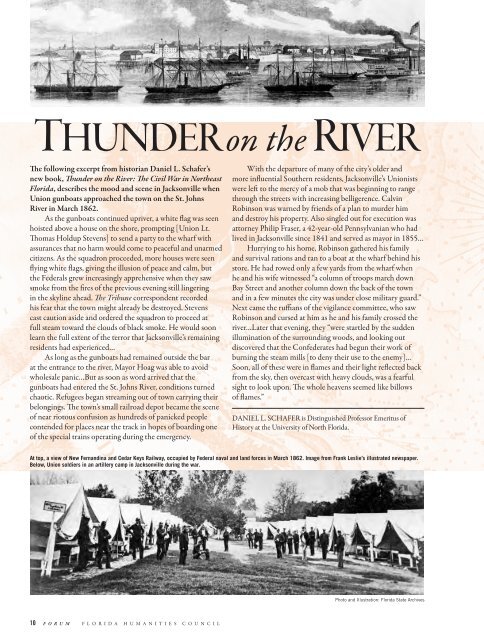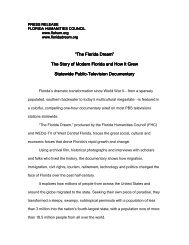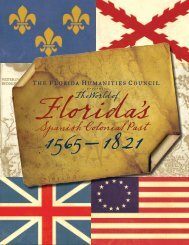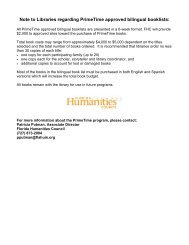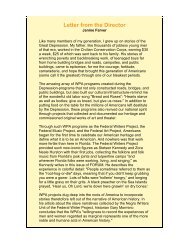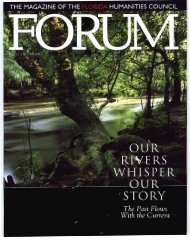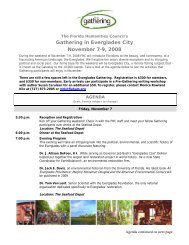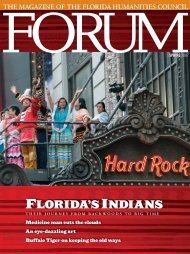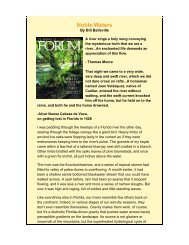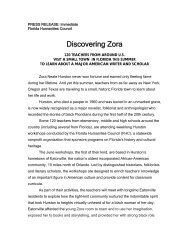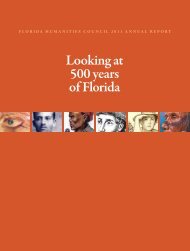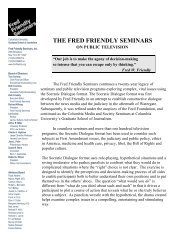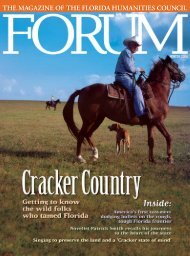when florida “Opened up the gates of hell” - Florida Humanities ...
when florida “Opened up the gates of hell” - Florida Humanities ...
when florida “Opened up the gates of hell” - Florida Humanities ...
Create successful ePaper yourself
Turn your PDF publications into a flip-book with our unique Google optimized e-Paper software.
THUNDER on <strong>the</strong> RIVER<br />
The following excerpt from historian Daniel L. Schafer’s<br />
new book, Thunder on <strong>the</strong> River: The Civil War in Nor<strong>the</strong>ast<br />
<strong>Florida</strong>, describes <strong>the</strong> mood and scene in Jacksonville <strong>when</strong><br />
Union gunboats approached <strong>the</strong> town on <strong>the</strong> St. Johns<br />
River in March 1862.<br />
As <strong>the</strong> gunboats continued <strong>up</strong>river, a white flag was seen<br />
hoisted above a house on <strong>the</strong> shore, prompting [Union Lt.<br />
Thomas Hold<strong>up</strong> Stevens] to send a party to <strong>the</strong> wharf with<br />
assurances that no harm would come to peaceful and unarmed<br />
citizens. As <strong>the</strong> squadron proceeded, more houses were seen<br />
flying white flags, giving <strong>the</strong> illusion <strong>of</strong> peace and calm, but<br />
<strong>the</strong> Federals grew increasingly apprehensive <strong>when</strong> <strong>the</strong>y saw<br />
smoke from <strong>the</strong> fires <strong>of</strong> <strong>the</strong> previous evening still lingering<br />
in <strong>the</strong> skyline ahead. The Tribune correspondent recorded<br />
his fear that <strong>the</strong> town might already be destroyed. Stevens<br />
cast caution aside and ordered <strong>the</strong> squadron to proceed at<br />
full steam toward <strong>the</strong> clouds <strong>of</strong> black smoke. He would soon<br />
learn <strong>the</strong> full extent <strong>of</strong> <strong>the</strong> terror that Jacksonville’s remaining<br />
residents had experienced…<br />
As long as <strong>the</strong> gunboats had remained outside <strong>the</strong> bar<br />
at <strong>the</strong> entrance to <strong>the</strong> river, Mayor Hoag was able to avoid<br />
wholesale panic…But as soon as word arrived that <strong>the</strong><br />
gunboats had entered <strong>the</strong> St. Johns River, conditions turned<br />
chaotic. Refugees began streaming out <strong>of</strong> town carrying <strong>the</strong>ir<br />
belongings. The town’s small railroad depot became <strong>the</strong> scene<br />
<strong>of</strong> near riotous confusion as hundreds <strong>of</strong> panicked people<br />
contended for places near <strong>the</strong> track in hopes <strong>of</strong> boarding one<br />
<strong>of</strong> <strong>the</strong> special trains operating during <strong>the</strong> emergency.<br />
10 F O R U M F L O R I D A H U M A N I T I E S C O U N C I L<br />
With <strong>the</strong> departure <strong>of</strong> many <strong>of</strong> <strong>the</strong> city’s older and<br />
more influential Sou<strong>the</strong>rn residents, Jacksonville’s Unionists<br />
were left to <strong>the</strong> mercy <strong>of</strong> a mob that was beginning to range<br />
through <strong>the</strong> streets with increasing belligerence. Calvin<br />
Robinson was warned by friends <strong>of</strong> a plan to murder him<br />
and destroy his property. Also singled out for execution was<br />
attorney Philip Fraser, a 42-year-old Pennsylvanian who had<br />
lived in Jacksonville since 1841 and served as mayor in 1855…<br />
Hurrying to his home, Robinson ga<strong>the</strong>red his family<br />
and survival rations and ran to a boat at <strong>the</strong> wharf behind his<br />
store. He had rowed only a few yards from <strong>the</strong> wharf <strong>when</strong><br />
he and his wife witnessed “a column <strong>of</strong> troops march down<br />
Bay Street and ano<strong>the</strong>r column down <strong>the</strong> back <strong>of</strong> <strong>the</strong> town<br />
and in a few minutes <strong>the</strong> city was under close military guard.”<br />
Next came <strong>the</strong> ruffians <strong>of</strong> <strong>the</strong> vigilance committee, who saw<br />
Robinson and cursed at him as he and his family crossed <strong>the</strong><br />
river…Later that evening, <strong>the</strong>y “were startled by <strong>the</strong> sudden<br />
illumination <strong>of</strong> <strong>the</strong> surrounding woods, and looking out<br />
discovered that <strong>the</strong> Confederates had begun <strong>the</strong>ir work <strong>of</strong><br />
burning <strong>the</strong> steam mills [to deny <strong>the</strong>ir use to <strong>the</strong> enemy]…<br />
Soon, all <strong>of</strong> <strong>the</strong>se were in flames and <strong>the</strong>ir light reflected back<br />
from <strong>the</strong> sky, <strong>the</strong>n overcast with heavy clouds, was a fearful<br />
sight to look <strong>up</strong>on. The whole heavens seemed like billows<br />
<strong>of</strong> flames.”<br />
DANIEL L. SCHAFER is Distinguished Pr<strong>of</strong>essor Emeritus <strong>of</strong><br />
History at <strong>the</strong> University <strong>of</strong> North <strong>Florida</strong>.<br />
At top, a view <strong>of</strong> New Fernandina and Cedar Keys Railway, occ<strong>up</strong>ied by Federal naval and land forces in March 1862. Image from Frank Leslie’s illustrated newspaper.<br />
Below, Union soldiers in an artillery camp in Jacksonville during <strong>the</strong> war.<br />
Photo and Illustration: <strong>Florida</strong> State Archives


